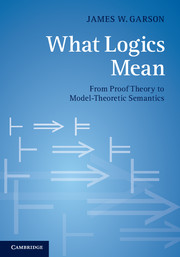Book contents
- Frontmatter
- Dedication
- Contents
- Preface
- Acknowledgements
- 1 Introduction to model-theoretic inferentialism
- 2 Deductive expression
- 3 Local expression
- 4 Global expression
- 5 Intuitionistic semantics
- 6 Conditionals
- 7 Disjunction
- 8 Negation
- 9 Supervaluations and natural semantics
- 10 Natural semantics for an open future
- 11 The expressive power of sequent calculi
- 12 Soundness and completeness for natural semantics
- 13 Connections with proof-theoretic semantics
- 14 Quantifiers
- 15 The natural semantics of vagueness (with Joshua D. K. Brown)
- 16 Modal logic
- Summary
- References
- Index
2 - Deductive expression
Published online by Cambridge University Press: 05 June 2014
- Frontmatter
- Dedication
- Contents
- Preface
- Acknowledgements
- 1 Introduction to model-theoretic inferentialism
- 2 Deductive expression
- 3 Local expression
- 4 Global expression
- 5 Intuitionistic semantics
- 6 Conditionals
- 7 Disjunction
- 8 Negation
- 9 Supervaluations and natural semantics
- 10 Natural semantics for an open future
- 11 The expressive power of sequent calculi
- 12 Soundness and completeness for natural semantics
- 13 Connections with proof-theoretic semantics
- 14 Quantifiers
- 15 The natural semantics of vagueness (with Joshua D. K. Brown)
- 16 Modal logic
- Summary
- References
- Index
Summary
The purpose of this book is to rigorously explore the inferentialist thesis that the rules of logic determine the meanings of the connectives. The answer to what a logic expresses about the connectives it regulates depends on how expressive power is defined. The purpose of this chapter is to explore a criterion for expressive power that has been common in the literature, and which was dubbed ‘deductive expression’ in Section 1.8. According to this benchmark, the news is not good for the inferentialist. In the overwhelming majority of cases, systems of logic underdetermine the meanings of the connectives they regulate (Section 2.2). Many different interpretations are compatible with what the rules deductively express. This chapter illustrates the problem in the case of propositional logic, reviewing negative results that are well known. Then we will consider an idea that would eliminate the underdetermination. It is that if any one connective is given the classical interpretation, then classical interpretations are fixed for all the others (Section 2.3). Although that condition seems fairly modest, it does not resolve the fundamental problem. The moral of the story will be that what is wrong is not the inferentialist’s thesis, but the benchmark we are using to adjudicate it. This will set the stage for better criteria that just happen to provide more optimistic answers.
Deductive expression defined
The main idea behind deductive expression is to ask what semantics is determined by the requirement that all the provable arguments of a system are valid. For example, suppose we have a set V of valuations, which, remember, are arbitrary (but consistent) functions from the wffs for propositional logic to the truth-values t and f. Assume that the arguments provable in a standard system for propositional logic are all V-valid. What does this tell us about the members of V? In particular, we want to know whether the valuations in V obey the familiar truth tables, or if not, whether they satisfy some other truth conditions for the connectives.
- Type
- Chapter
- Information
- What Logics MeanFrom Proof Theory to Model-Theoretic Semantics, pp. 25 - 33Publisher: Cambridge University PressPrint publication year: 2013



